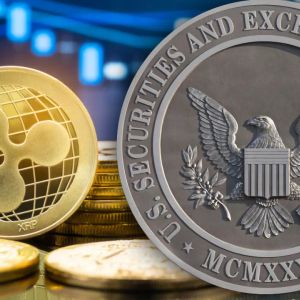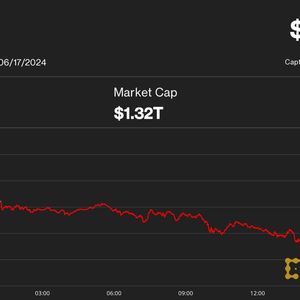

Grayscale Bitcoin Trust: Will They Win The ETF Case? And When?
Summary I see 19% weighted average return to GBTC from a legal opinion that could come by the summer. Conversion to an ETF could close the current 40% discount to NAV almost overnight. However, there is still a good chance the SEC prevails or that the legal process is delayed into 2024-25. Though not without risk, this is an interesting opportunity uncorrelated with broader markets. Grayscale Bitcoin Trust (GBTC) holds Bitcoin for investors in its trust. It trades at a significant discount to NAV, as today it's a relatively high fee and complex way to own Bitcoin, and currently there's no way to close the discount. However, Grayscale has proposed converting the Trust to an ETF that would collapse any discount, though the SEC blocked that plan, and GBTC are in the process of appealing the decision. For example, here is an ETF with a 2%+ fee that trades at NAV. Trading very close to NAV is a function of the ETF creation/redemption structure and it should occur regardless of the fee structure or underlying assets. The Courts will rule on Grayscale's case, perhaps in summer 2023. I've written about this trade previously, but now I want to get into greater quantitative detail on win/loss probabilities, base rates and timings. Please reference the prior article for a more general overview and quick reaction to the day of the oral argument, if needed. The SEC Wasn't Unanimous In Its Spot Bitcoin ETF Ruling First off, it's interesting that SEC Commissioner Hester Peirce did not approve the ruling disapproving the spot Bitcoin ETF. Peirce does not vote with the other commissioners reasonably often, so this is certainly not unprecedented behavior. Still it's interesting that even the SEC itself is not full aligned on the decision to block a spot Bitcoin ETF. It suggests that maybe even the SEC can see cracks in its own position. Peirce disagrees with other SEC commissioners (SEC commission votes: https://www.sec.gov/about/commission-votes/2022/commission-votes-2022-06.xml) The SEC Is Does Lose In Court Historical data suggests that the SEC could certainly lose its case against Grayscale. A fantastic resource here is Cornerstone Research , they analyze the enforcement actions of the SEC and the SEC releases its own report . In aggregate, the SEC tends to win around 70% to 80% of legal cases depending on the period studied. However, that data isn't exactly comparable to the Bitcoin ETF case that Grayscale are bringing here, because a lot of these cases relate to things like insider trading prosecution or the Foreign Corrupt Practices Act. These are cases the SEC chooses to bring to trial rather than drop or settle. Decisions on how crypto-currency should be regulated are something of a different animal and Grayscale is bringing this case to court, not the SEC, and doing so at a time when criticism of the SEC for its handling of crypto is growing. Still the SEC certainly can lose in court, just not that often. The SEC has lost cases relating to Wal-Mart and a case on data fees. These are arguably more similar to the Grayscale case in challenging the SEC's regulatory actions. So the SEC does not lose in court much, but that's because of the selection effect in the cases it brings to trial. For the spot Bitcoin ETF case, it is Grayscale, not the SEC bringing this to court and using a former Solicitor General to do so. That may tilt the odds in Grayscale's favor. At the same time, the SEC's general approach to crypto regulation has come under attack from the Senate . Of course, there are political undertones here, but Senators pick their battles and the SEC's crypto regulation has been arguably inconsistent and vague. Politics should not influence the court directly, but arguably others are seeing the same inconsistencies in the SEC's actions that the court may pick up on. The Strength Of Grayscale's Argument Grayscale appears to have a very strong legal argument. Yes, regulators have a lot of autonomy to regulate their field, by design. However, there are some guard rails against arbitrary regulation. This may be the strongest pillar of Grayscale's case. It appears arbitrary for the SEC to have approved Bitcoin futures ETFs like ProShares Bitcoin Strategy ETF (BITO) and to not approve Grayscale's proposed Bitcoin spot ETF. That's because if you're worried about "fraudulent and manipulative acts" in the Bitcoin spot market, which the SEC clearly are, then it's pretty hard to argue that the futures market is ok and the spot market is not, because ultimately any futures market literally becomes the spot market at the end of the life of the contract. The Technical Point That May Help The SEC One technical point in favor of the SEC (you can read their initial argument here ) is that Bitcoin futures are run by the CME group. That's a platform the SEC has a strong relationship with for what it terms "surveillance sharing." This means that the SEC can get direct information from that exchange about who's trading Bitcoin futures, as a way to detect the culprits if market manipulation were occurring. With spot Bitcoin, almost by design, the SEC does not have the same ability to track market participants and their trades. If there's manipulation, the SEC may not know who to go after. Again Grayscale argues that the creation of a spot Bitcoin ETF gives the SEC more insight into who's trading Bitcoin, not less, as more Bitcoin-related liquidity would trade via the NYSE. However, this technical argument is likely what would help the SEC prevail. Also, for what it's worth other spot Bitcoin ETFs trade on other non-US exchanges and are apparently fine, as well as many 'direct' Bitcoin offerings from entities that the SEC regulates. The Judges - One Appears In Favor Sri Srinivasan, Neomi Rao, and Harry Edwards will rule on the case. Either party, essentially, needs at least 2 judges in support to win (i.e. a 3-0 vote or a 2-1 vote). From her questioning during oral argument Rao appears to offer some support to Grayscale's case. That's encouraging, but at least one other judge would need to align with her and that's less clear. We'll come back to that when we run the numbers below. Timing Of An Opinion - Summer 2023 Looking at prior cases involving the SEC, a ruling between July and September appears most likely. That's based on looking at similar cases involving the SEC and the courts and the gap between oral argument (held in March 2023 in this case) and an opinion. The CEO of Grayscale has said to expect a decision before the end of Q3 , which I think like a lot of CEO guidance, bakes in a little conservatism as a decision could come sooner but he doesn't want to make a statement that is contradicted by events. However an appeals process could delay any final decision by up to year and that matters for the investment case. The biggest question is whether Grayscale receives a favorable opinion, but the second question is whether the SEC then would appeal that decision. Potential Outcomes Potential case outcomes (Author's analysis) So in order for us to see a Bitcoin ETF in summer, then Grayscale must win the case and the SEC must not appeal. Other outcomes imply the discount to NAV will persist for at least a year or possibly indefinitely. Probability of Winning The Case Now we'll estimate the outcome in different ways Method Assessment Probability of Grayscale favorable opinion Past SEC legal outcomes Historically the SEC do win in court frequently, though this sort of case is less proven for the SEC vs. say insider trading cases so taking the lower end of the historical range 30% Assessment of judges questions during oral argument One Judge Rao appears in favor, others less clear, need 2 judges for favorable opinion. 50% chance either other judge is against and if both are against Grayscale lose. (i.e. 1 - (50% x 50%) 75% Strength of legal argument It does seem hard to argue that a spot market can be manipulated and the futures market will not be (as the SEC argues). Their technical argument about market surveillance may prevail, but the court may well want to keep the SEC in check here as they seem "arbitrary" in their behavior and are definitely at the fringes of consistent behavior 70% Simple Average of Three Above Methods Average of above three values 58% Then even if Grayscale win, will the SEC use an appeal or some other means to block a Bitcoin ETF? I think this is possible, but given all the heat the SEC is getting over crypto regulation I don't know if spot Bitcoin ETF is a hill they want to die on when a futures Bitcoin ETF already exists. Hence I think there's only a 25% chance the SEC pursues this further if they lose the case. I also for simplicity assume Grayscale do not win on appeal if the initial opinion goes against them. Hence: 58% x 75% (i.e. 1-25%) = 43.5% chance of spot Bitcoin ETF (note: false precision, obviously) Outcomes For GBTC Outcome Return to investors Logic Spot Bitcoin ETF +67% Current 40% discount to NAV collapses to 0% (this is how ETFs work) No Spot Bitcoin ETF (Current Trust Structure) -17% Current 40% discount to NAV increases to 50% (largest historical NAV discount is 47%, assume there is some sell off as a Bitcoin trust is basically an orphaned security when there are plenty of better/cheaper ways to own Bitcoin) Weighted Average Outcome +19% Probability Return Probability Weighted Return Spot Bitcoin 43.5% +67% +29% No Spot Bitcoin 56.5% -17% -9% Weighted outcome +19% Conclusion This is an interesting, uncorrelated setup. The expectation of an estimated 19% return over the next few months appears enticing, and is why this is currently among my largest positions. Of course, that said, if the model above proves accurate you are still more likely to lose money , but the upside case more than offsets that risk in expected value terms. Risks Bitcoin is an extremely volatile asset historically speaking, it's up almost 50% YTD and such swings are not unusual. Even if the above analysis comes out favorably you could lose money because Bitcoin falls in value during the investment period. Or indeed, Bitcoin price swings may make a negative outcome even worse Even though the expected value is favorable here, you still more likely to lose money than make money if the above analysis is correct The above analysis attempts to quantify qualitative variables, which can be risky and create the illusion of false precision There are other edge cases not considered in the above analysis. For example, one is that Grayscale receive a favorable opinion but stick with a trust structure regardless Many legal decisions are slow and it's possible that legal delays here may the expected return unattractive on time-weighted basis If Grayscale do get an unfavorable opinion a lot of participants in this trade may sell out, causing GBTC to trade further below NAV than historically There is also the risk that the Bitcoin held by GBTC are stolen or lost in some other way or that Bitcoin becomes technically obsolete Editor's Note: This article was submitted as part of Seeking Alpha's Best Investment Idea For A Potential Recession competition, which runs through April 28. This competition is open to all users and contributors; click here to find out more and submit your article today!













